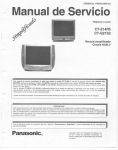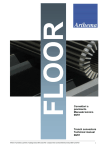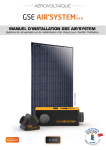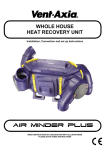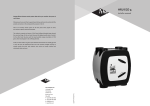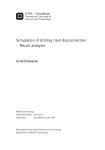Download New World CHIM60B
Transcript
Chimney Hood User & Installation Instructions Customer Care Thank you for choosing this appliance. Should you need any information or assistance, please call the number below and the Customer Care Centre staff will be pleased to help in any way they can. 0870 458 9662 When you dial this number you will hear a recorded message and be given a number of options. This indicates that your call has been accepted and is being held in a queue. Calls are answered in strict rotation as the Customer Care Representatives become available. When calling please have to hand you appliances model and serial numbers. These numbers help us to quickly identify your product and enable the Customer Care team to provide you with the most up to date advice and support. Outside the UK and Northern Ireland, refer to your local supplier. Contents User’s Section . . . . . . . . . . . . . . . . . . . . . . . . . . . . . . Introduction . . . . . . . . . . . . . . . . . . . . . . . . . . . . . . . . . . . . . Parts Identification. . . . . . . . . . . . . . . . . . . . . . . . . . . . . . . . . Using the Hood . . . . . . . . . . . . . . . . . . . . . . . . . . . . . . . . . . Care and Maintenance . . . . . . . . . . . . . . . . . . . . . . . . . . . . . ........2-5 ............2 ............3 ............4 ............5 Installation . . . . . . . . . . . . . . . . . . . . . . . Regulations and standards . . . . . . . . . . . . . . . . . Ventilation & Mounting height . . . . . . . . . . . . . . Method 1: Re-circulation . . . . . . . . . . . . . . . . . . Method 2: Extraction through an outside wall . . . Wall Fixing . . . . . . . . . . . . . . . . . . . . . . . . . . . Installation Illustrations . . . . . . . . . . . . . . . . . . . . Hood Measurements . . . . . . . . . . . . . . . . . . . . . Electrical Connection. . . . . . . . . . . . . . . . . . . . . . . . . . . . 6 - 10 ............6 ............6 ............7 ............8 ............9 ............9 . . . . . . . . . . . 10 . . . . . . . . . . . 11 ......... .......... .......... .......... .......... .......... .......... .......... .......... Technical Data . . . . . . . . . . . . . . . . . . . . . . . . . . . . . . . . . . . . . . . 12 Customer Support . . . . . . . . . . . . . . . . . . . . . . . . . . . . . . . . . . . . . 13 1 Introduction Installation Thank you for buying this hood, we hope that it makes an attractive and useful addition to your kitchen. This appliance has been designed for use as an exhausting (air evacuation to the outside) or filtering (indoor air re-cycling) hood. This handbook contains information which will help you to install and use your new hood, and we recommend that you read it fully before you start. This handbook is for the following hoods: 60 Chim Hood 70 Chim Hood 90 Chim Hood 100 Chim Hood 110 Chim Hood Note: If you wish to install the hood for extraction through an outside wall, a compatible ducting kit should be obtained. Because of the complexity and weight of the appliance, it is recommended that the installation be carried out by specialist personnel. The manufacturer declines all responsibility for damage caused by improper or unworkmanlike installation. Our policy is one of constant development and improvement. Strict accuracy of illustrations and specifications is not guaranteed. Modification to design and materials may be necessary subsequent to publication. Please read this handbook carefully and keep it for future reference. Before installing this appliance, you may need to contact our Customer Care Centre in order to purchase certain parts. Please see the details in the Customer Service section of this handbook. Before using the appliance for the first time, remove all packaging and protective polythene film. Your first year Guarantee To fulfil the conditions of your guarantee, this appliance must be correctly installed and operated, in accordance with these instructions, and only be used for normal domestic purposes. Please refer to your guarantee card for further details. Please note that the guarantee, and Service availability, only apply to the UK and Republic of Ireland. 2 Parts Identification Figure 1 Viewed from underneath removable grease filters slider motor light bulb lamp covers inner chimney extension piece outer chimney extension piece Outlet adaptor wall bracket adjustable Please note: The lights on the Chimney hood may located either at the front of the hood, or at the rear, depending on the model and size. Not all models will have an outlet adaptor, certain models have a 150mm outlet with a 150/120mm reducer supplied. 3 Using the Hood A 0 1 2 3 T B C D E F To illuminate the cooking area underneath the hood, push the light control button in to the “on” position. To switch off, press again to return to the “off” position. To operate the hood, press the button for the required speed - select: 1 low, 2 medium, or 3 high speed. The neon indicator light (if fitted) will light up to show when the fan is operating. To switch off, press the “off” button. Figure 2A: hood controls: The controls work as follows: A - Neon light B - Off C - Position 1 D - Position 2 E - Position 3 F - Light switch Important safety notes Figure 2B: hood controls: The controls work as follows: A - Neon light (if fitted) B - Off C - Position 1 D - Position 2 E - Position 3 We recommend that you switch on the hood for a few minutes before you start cooking, and then leave it running for approximately 15 minutes afterwards to ensure that all odours are extracted. • Keep hob rings covered with pans when switched on to avoid damaging the hood. The use of an unprotected flame can cause a fire hazard. • Do not flambé food underneath the hood. • When frying foods, take care to avoid cooking oil flares. • Wash the grease filters regularly refer to the cleaning section. • Do not check filters while the hood is in use. • Do not touch the lamps after prolonged use of the appliance. Re-circulation method only: 4 • Keep the air ducting vents clear of obstruction. • Change the carbon filters every 4 month. Care & Maintenance Before cleaning or maintenance, switch off the electricity supply. 4. Aluminium grease filters are supplied with this appliance. Outer casing - Stainless Steel Replacing a light bulb 2. Remove the grease filters from the hood. All external parts of the outer casing and visor can be safely cleaned with a clean cloth wrung out in hot soapy water. 3. Unscrew the bulb from the holder. Replacement bulbs can be obtained from your supplier or local hardware store. Do not use caustic pastes, abrasive cleaning powders, wire wool and hard implements, as they will damage the surfaces. 4. Fit the new bulb, ensuring it is screwed securely into the holder. Carbon filters not supplied. 1. Switch off the electricity supply. The carbon filters absorb cooking odours and need renewing after about 4 months of normal use. A replacement carbon filter can be obtained from your supplier. 5. Refit the grease filters. Light bulbs are not covered by the warranty To avoid any fire risk, the following cleaning instructions must be followed: Saturation of the activated charcoal in the filter will depend on how often the hood is used, the type of kitchen and the regularity of cleaning the grease filter. Grease filters - aluminium The grease filters absorb grease and dust from cooking fumes, which would otherwise damage the inside of the hood. The carbon filters cannot be washed - renew every 4 months. 1. Remove the grease filters from the hood. The grease filter should be removed and cleaned regularly - with normal use, this should be every 2 months. 2. Release the old carbon filters by twisting them in either direction by a quarter turn (90˚) until they disengage. Important: Frequent washing is essential to prevent a build up of grease in the filters which could become a fire hazard. 3. Fit the new carbon filters by engaging them onto the pegs in the centre of the fan grille and twisting by a quarter turn until they are gripped securely. 1. Remove the filters from the hood. 2. Carefully wash the grease filters in hot soapy water and dry with a clean towel. 4. Refit the grease filters. 3. Refit the clean filters. 5 Installation Regulations and standards Mounting height Before you start please read instructions carefully. All installations, service and repair work must be in accordance with local standards and regulations. The cooker hood must be fitted at least 650 mm above a gas or electric hob. If cooker / hob instructions give a different figure to that given above, then the higher measurement should be followed. In the UK the regulations and standards are as follows:- To prevent possible hood cut-out, a clearance of 650 mm is recommended above gas hobs where possible. 1. Building regulations. 2. The current I.E.E. wiring regulations. 3. Electricity at work regulations. 4. Installation and servicing instructions for this appliance. Select method of operation The cooker hood has two possible methods of operation: Ventilation Method 1: Re-circulation requires carbon filters. Installation with dual filtration to clean the air before it is re-circulated into the room. Adequate ventilation, in accordance with the Gas Safety Regulations (Installation and Use), and the relevant building regulations must be provided when the hood extracts air from a room with a flued gas burning appliance, which is not of the “balanced flue” type. Method 2: Extraction through an outside wall requires a ducting kit. The hood can be installed with a duct to extract cooking fumes through an outside wall. Dimensions Please note that all dimensions and sizes are nominal, some variation is to be expected. 6 Installation Method 1: Re-circulation (dual filtration) Assembly The fan draws cooking fumes through the washable grease filters into the underside of the hood, then through the carbon filter, to remove odours before returning clean air to the kitchen via the air ducting vents. 2. Fit the carbon filter (if supplied may be packed separately) by engaging it onto the peg in the centre of the fan grille and twisting in either direction by a quarter turn (90˚) until it is gripped securely. If a cooker hood and any non electrically powered appliances extract fumes at the same time, then the room must be suitably ventilated. 3. Discard the outlet adaptor as it is not required when installing the cooker hood as a re-circulation filter. 1. Remove the grease filters. When selecting the best position for the hood, ensure that air flow from the air ducting vents is not obstructed by cupboards, shelves, etc. Do not vent into enclosed cupboard space. This method may require you to purchase carbon filters, these are available from Customer Care Centre. Please see the Customer Care section of this handbook for further details. 7 Installation Method 2: Extraction through an outside wall Wall vent kit and ducting The fan draws cooking fumes through the washable grease filter into the underside of the hood, then the fumes are expelled through a duct or directly through an outside wall. This method may require you to contact the Customer Care Centre to purchase a ducting kit. You may however prefer to use your existing ducting, if it is appropriate. Figure 3 outlet adaptor • For connecting the hood outlet adaptor to the outside wall, we recommend that a wall vent kit is purchased from your supplier or local hardware store. • Use a 125 mm diameter ducting kit and connect to the ducting outlet adaptor. • Horizontal duct runs should be avoided. A slope of 5˚ or more upwards from the hood to the wall outlet will assist the flow of air. • The ducting pipe and any connecting pieces should be coupled to the preceding piece by pushing into and never over it - the upper part must be fitted over the lower part. • The outlet from the hood must not be ducted into a wall cavity, through a ventilator shaft or through a chimney. It must not be ducted through a flue used by a non-electrically powered appliance. • Adequate ventilation must be provided if a cooker hood extracts fumes from the room at the same time as an appliance powered by a fuel other than electricity (such as a gas appliance) is operated. The extractor hood removes air from the room which the burner is dependant on for combustion. Assembly 1. Remove the grease filters. 2. Remove the carbon filter (if fitted) and discard, as this is not required when installing the cooker hood as an extractor fan. 3. Connect the discharging pipe to the ducting outlet adaptor, and route the pipe through a 130 mm hole in the rear wall. 8 Installation Wall fixing (figures 4 & 5A / 5B) Drill 8 mm diameter holes as shown. • Using the screws and dowels supplied with the appliance, fasten the wall bracket to the wall. • Ensure that they are suitable for the type of wall where the cooker hood is to be mounted. • Fig 5A :Locate and fasten the hood to the wall through holes C, and secure through holes D. • • • A wall bracket adjustable C 40 mm D Fig 5B: Drill holes A in the wall, making sure that they are in line with the distances quoted. 492 mm Figure 5A 20 mm Locate the 2 junction pieces as shown. Secure the top junction piece to the wall bracket through the side holes using the screws provided. In some cases it may be necessary to adjust the length of one or both of the chimney sections. Cut the bottom of each section so that the cut is hidden using suitable cutting implements. Please take care not to obstruct the ducting vents used in the re-circulation method. A C 235 mm Figure 5B Re-circulation mode only • Since the side vents are located in the upper chimney section, no L-shaped air flow directing piece is required. 9 260 mm • Figure 4 Installation Hood Measurements The below table shows the various hood measurements for this hood: Body of hood Width mm Depth mm Height mm 60cm Chimney Hood 600 485 190 70cm Chimney Hood 700 485 190 90cm Chimney Hood 900 500 260 100cm Chimney Hood 1000 500 260 110cm Chimney Hood 1100 485 190 Hood Name The dimensions of the chimney piece (including the hood body) are as follows: 250mm x 183mm x 590-960mm This is W x D x H. 10 Installation Electrical connection Figure 6 This appliance is double insulated for safety and therefore does not require an earth connection to the mains inlet. Typical example of a double pole fused spur outlet The wires in the mains lead are coloured in accordance with the following code: ON Blue = neutral, Brown = live. FUSE As the colours of the wires in the mains lead for the appliance may not correspond with the coloured markings identifying the terminals in your spur box, proceed as follows: Use a 3 amp fuse 1. The wire which is coloured blue must be connected to the terminal marked N (neutral) LOAD, or coloured black. Live 2. The wire which is coloured brown must be connected to the terminal marked L (live) LOAD, or coloured red. N SUPPLY L The fused spur socket should be positioned where is is easily accessible so you can switch off the supply to the hood when renewing the light bulb. N LOAD LOAD 13 250 L ~ Neutral Cable 11 Technical Data Electricity supply 230 - 240V ~ 50Hz Grease filters x 2 metal filters Classification class II metal encased Extraction Rate (External) Position 2 350m3/H 310m3/H Position 1 225m3/H Position 3 Noise level (External Venting) Position 3 56 dBA Position 2 49 dBA Position 1 42 dBA Extraction Rate (Internal) Position 2 270m3/H 205m3/H Position 1 170m3/H Position 3 Noise Level (Internal Venting) Position 3 59 dBA Position 2 54 dBA Position 1 47 dBA Light bulbs 2 x 40 W. Candle lamp, small edison screw fitting. Note: If the hood is to be used for display purposes only, we recommend the use of 25 W lamps. Motor rating 120W Carbon filters x 2 - available as Spares 12 Customer Care & Service Please keep this handbook in a safe place as the information inside may be of use should you sell, or pass on the appliance. Please fill in the model number and serial number in the spaces provided below as they will assist us should you need to call. 0870 458 9662 When you dial this number you will hear a recorded message and be given a number of options. This indicates that your call has been accepted and is being held in a queue. Calls are answered in strict rotation as Customer Care Representatives become available. Enter appliance numbers here for future reference: Model No Serial No Please ensure you have the above details (Model No and Serial No) to hand when calling Customer Care. They are essential to booking your call, or ordering any spare parts. Spares for this appliance: Carbon Filters - 082620630 Ducting Kit 1m - 082611309 Ducting Kit 3m - 082611310 Outside the UK and Northern Ireland, refer to your local supplier. 13 Stainless Steel Backplate (IF PURCHASED) Installation 1. Fix the 2 top hanging screws to the dimensions indicated. 2. Hang the backplate on the 2 top hanging screws. 3. Secure the backplate with screws through the bottom 2 fixing holes. Note: If a cooker hood is fitted above the backplate, it may be necessary to fit the filler strip, to cover any gap which may occur between backplate and hood. Some dimensions may not apply Filler strip 100 mm 695mm - 900BP 795mm - 1000BP (if required) 100 mm 6mm 694mm 700mm Backplate worktop / cooker top 895mm - 900BP 995mm - 1000BP, Care & Cleaning can mark the surface of stainless steel, but will become less noticeable with time. Do not use caustic pastes, abrasive cleaning powders, products containing bleach, coarse wire wool or any hard implements, as they will damage the surfaces. Extra care should be taken when cooking food in salted water. Some foods are corrosive - eg; vinegar, fruit juices and especially salt - they can mark or damage stainless steel if they are left on the surface. Wipe any splashes immediately. Stainless steel backplates Only use a clean cloth wrung out in hot soapy water, and dry with a soft cloth. Stubborn marks can be removed using a stainless steel cleaner. We recommend that you clean the whole of the stainless steel area to maintain a uniform finish. To maintain the finish of the stainless steel, or to remove any greasy marks, rub the stainless steel surface sparingly with a minimum amount of Baby Oil. Do not use cooking oils, as these may contain salt which can damage the stainless steel surface. Do not use undiluted bleach or any products containing chlorides as they can permanently damage the steel. Sharp objects 14 15 3LI0D2D302.5 D3 GLEN DIMPLEX HOME APPLIANCES STONEY LANE, PRESCOT, MERSEYSIDE, L35 2XW 08 27136 01 © 08.2004


















